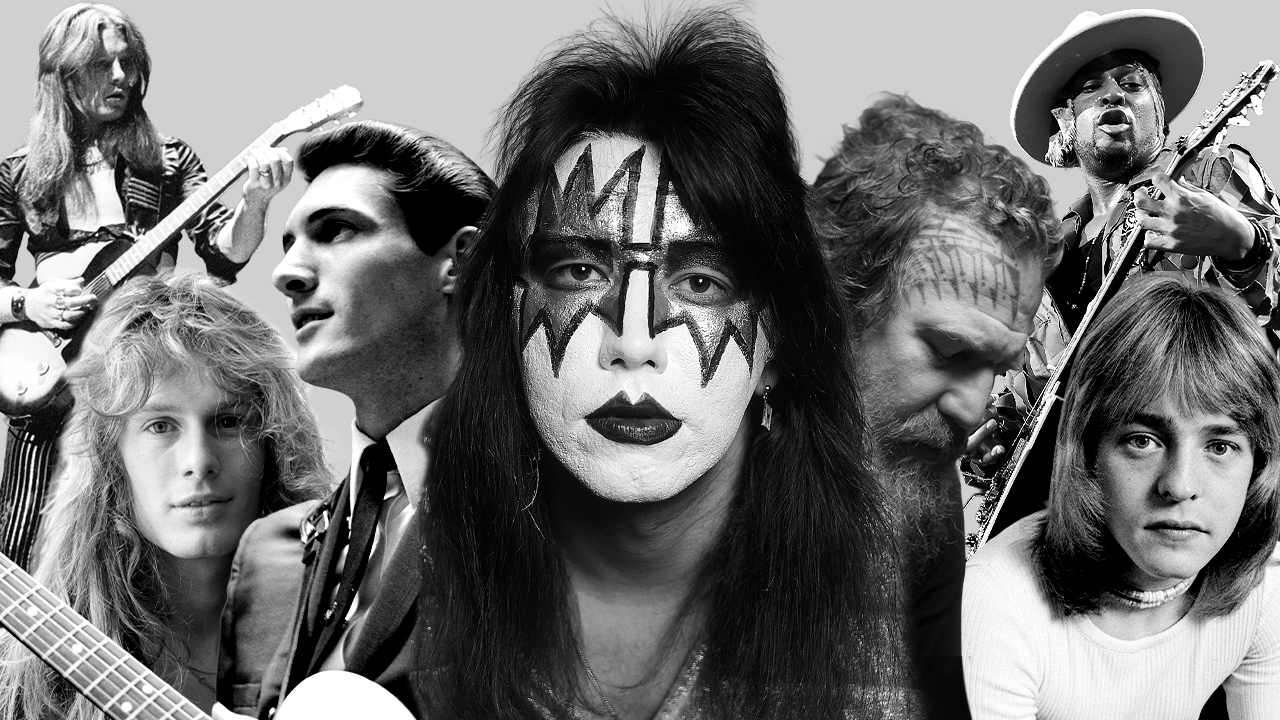How Leo Birenberg and Zach Robinson wrote the perfect score for Netflix blockbuster series Cobra Kai
It’s badass, it’s very '80s, and – spoilers – it involves lots of guitars…
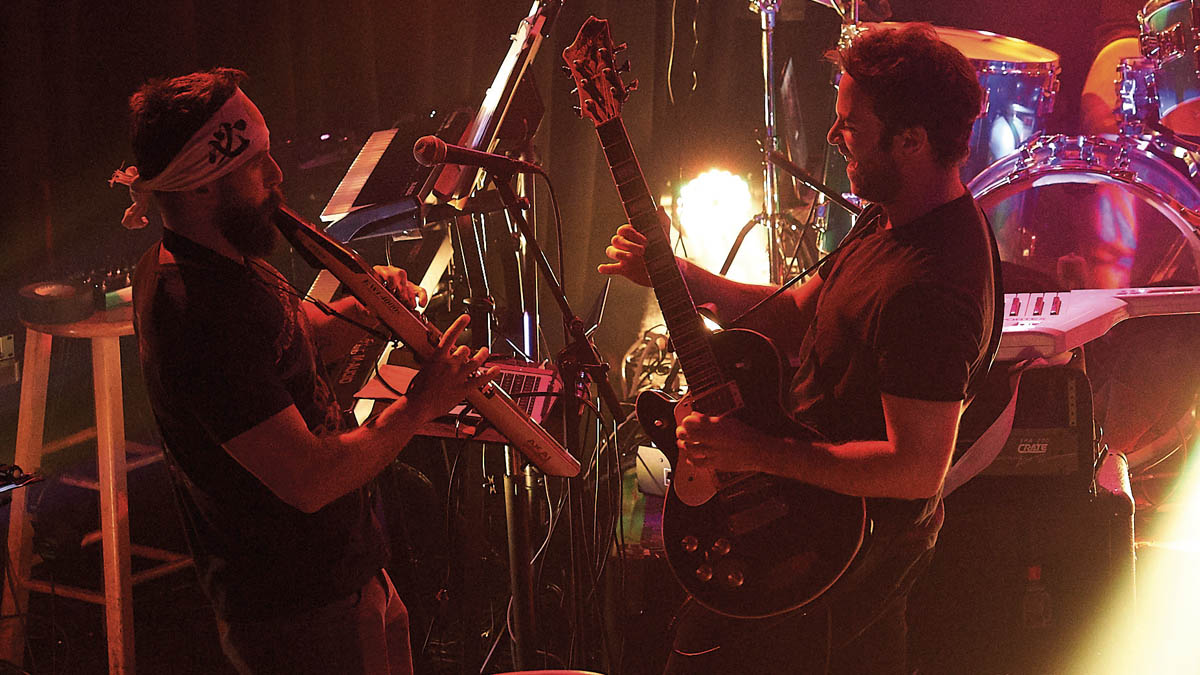
Here at Guitar World, we tend to emphasize the guitar as a vehicle for writing and performing original music in the traditionally understood rock ’n’ roll paradigm – you get up onstage with a band to play songs, garner an audience and, if you’re lucky, make some records and build a career.
To be sure, that’s one road to success in the music industry. But there are, of course, many others to travel. Just ask Leo Birenberg and Zach Robinson, two musicians who have built thriving careers as composers and scorers for film and TV, and for the last few years, have created all the original music for the breakout Netflix series Cobra Kai.
The show, as everyone with an internet connection knows by now, is an update of the 1984 blockbuster The Karate Kid, and revisits the titular star, Daniel LaRusso (played by Ralph Macchio) and his hard-living, hard-drinking, hair-metal-loving high-school karate nemesis Johnny Lawrence (William “Billy” Zabka) in the present day as two (ostensibly) grown men navigating life, love and middle age – and who still want to kick each other’s asses hard.
During two seasons on YouTube, Cobra Kai shattered records, with Season 1 named the world’s most in-demand streaming television show during May 2018. After moving to Netflix for Season 3, Cobra Kai became, for a period, the most viewed original series on a streaming platform.
And while the warring senseis, nostalgia-soaked relationships and comically over-the-top toxic masculinity are what keeps fans coming back season after season, Cobra Kai is, in many ways, held together by its music.
Throughout the episodes, Daniel and Johnny’s individual hero’s journeys are soundtracked by a dynamic, innovative and downright fun score that is grounded in Eighties rock and hair metal, and then ornamented with everything from orchestral music and traditional eastern flutes and strings to modern synth wave, heavy metal and video game sounds.
In fact, the score has garnered enough of its own fanbase that, following Season 2, Birenberg and Robinson, with a little help from some friends (including Johnny Lawrence himself), took the most well-known compositions to the stage of the famed Whisky a Go Go in Hollywood for a live performance of Cobra Kai’s greatest hits.
All the latest guitar news, interviews, lessons, reviews, deals and more, direct to your inbox!
Birenberg and Robinson boast extensive resumes in the scoring world, but they’re also quick to acknowledge that working on a show with such rich history and, let’s face it, ties to badass music (what child of the ’80s can’t sing the chorus to You’re the Best or Cruel Summer?) is a dream come true. “It’s like the Hollywood story that never happens in Hollywood,” Birenberg says.
On the eve of the premiere of Cobra Kai’s highly anticipated Season 4, the two sat down with Guitar World to detail how it all came to be.
How did you get involved with Cobra Kai?
The vibe of the show hits that perfect tone of being reverential but also self-aware
Leo Birenberg
LEO BIRENBERG: “It’s a dream story, which is that we read about Cobra Kai in the trades, either Variety or Hollywood Reporter, and there wasn’t any real information – it just said there was a show being made called Cobra Kai, and somehow it’s related to the Karate Kid IP.
“There was no cast announced or anything. But the article did say the show was going to be on YouTube Premium, and Zach and I had just done a show on YouTube Premium and we were looking for a next gig. And we were like, ‘This seems kind of like our jam…’
“So we put a reel together and sent it to our agent and said, ‘Hey, we don’t know anything about this, but it feels like the right vibe for us. Can you get it in the hands of whoever needs to see it?’
I think the thing that separated us from anyone else that would have submitted was that we really leaned into the ’80s-ness of it
Zach Robinson
“A lot of times when you do that, you never hear about a gig ever again; it just goes off into the void and you have no idea until the show comes out two years later. But somehow the wires crossed in serendipity, because someone over at Sony called our agents to talk about Cobra Kai. And our agent was like, ‘Wait, these guys really want to do the show – I have a reel!’
“He sent it over and got in the hands of the Cobra Kai show runners and creators, and I guess we nailed the vibe because they called us in for a meeting. And it was super-clear we were on the same page. Then they sent us some scripts and it was even better than Zach and I could have possibly imagined.
“First of all, Billy [Zabka] and Ralph [Macchio] were in it. And also, the vibe of the show, it hits that perfect tone of being reverential but also self-aware. So we had a great bonding session with the guys and they hired us like 15 minutes after the meeting ended.”
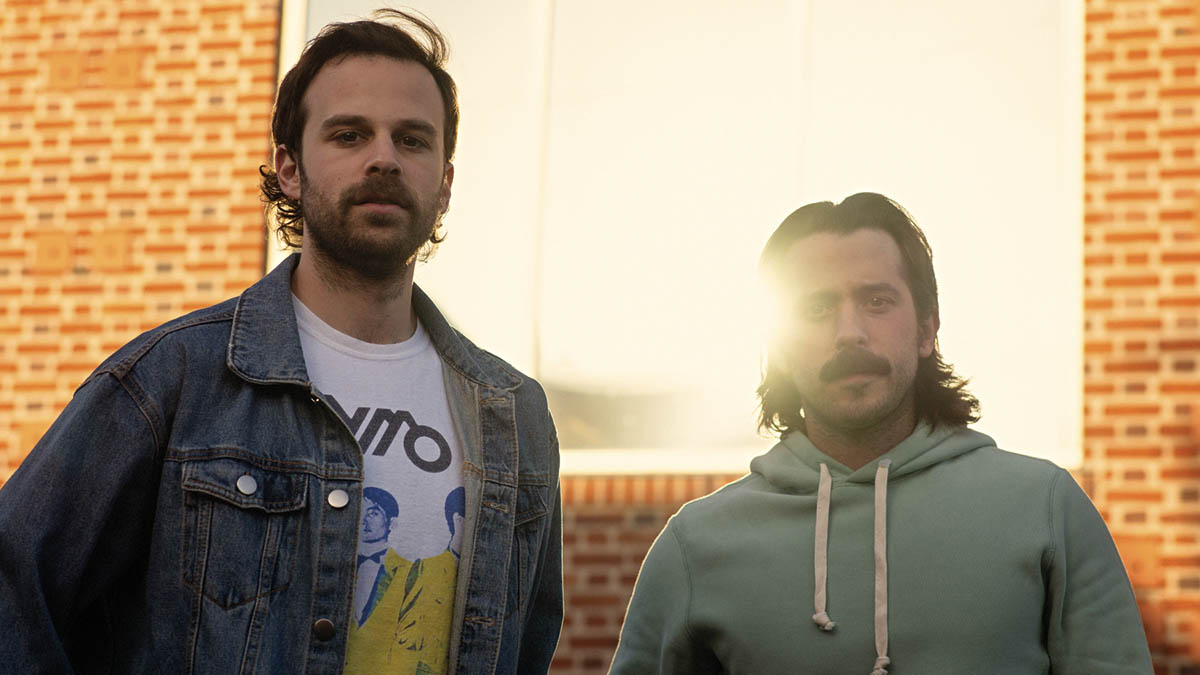
Did your initial reel consist of the type of music you thought the Cobra Kai team would want to hear? Given the subject matter, I imagine there was an ’80s rock vibe.
ZACH ROBINSON: “Yeah, part of it was. We had actually put the reel together before reading the scripts. As Leo said, this was a total blind reel; we knew nothing about this show. This was just what we felt in our hearts that this music should be.
“We’ve both worked on big Hollywood movies – we used to work for a composer named Christophe Beck, and we wrote music for action movies like Edge of Tomorrow and Ant-Man, so we put some of that on, too. So the scope of the reel ranged from hard rock stuff to orchestral material, like that classic, symphonic film score sound, and all based off The Karate Kid.
“But I think the thing that separated us from anyone else that would have submitted was that we really leaned into the ’80s-ness of it. You know, we had some ’80s montage tracks that we had done as joke, because every comedy has an ’80s montage, right? But we were like, 'This is where we do it for real.'”
BIRENBERG: “That was a major part of our pitch.”
ROBINSON: “I also had an electronic music project in the early 2010s, like a solo electronic music project that was kind of synth wave before it was called synth wave. And there was some of that on there as well. So it was like, ‘We do ’80s rock stuff. We do ’80s synth stuff. And we also do film scores!’
You guys clearly aren’t old enough to have actually grown up in the ’80s. Is this music that you truly love, or do you just have a knowledge of and appreciation for it from a distance?
BIRENBERG: “For me, it’s more like one of many types of music I listen to. I’m really all over the place in my music background; I grew up playing saxophone and clarinet and flute, and I was heavy into jazz. My guitar-loving background comes much more from a Pat Metheny place than like a hard rock place. So my aesthetic is less pure hard rock.”
ROBINSON: “It’s music that I love. Growing up in L.A., I was a metal head – your standard classic-rock-into-metal guitar player. That’s kind of a rite of passage there, because that type of music is in L.A.’s DNA. Later on I got into film scores and all that, but I’ve always had a soft spot for the ’80s aesthetic.”
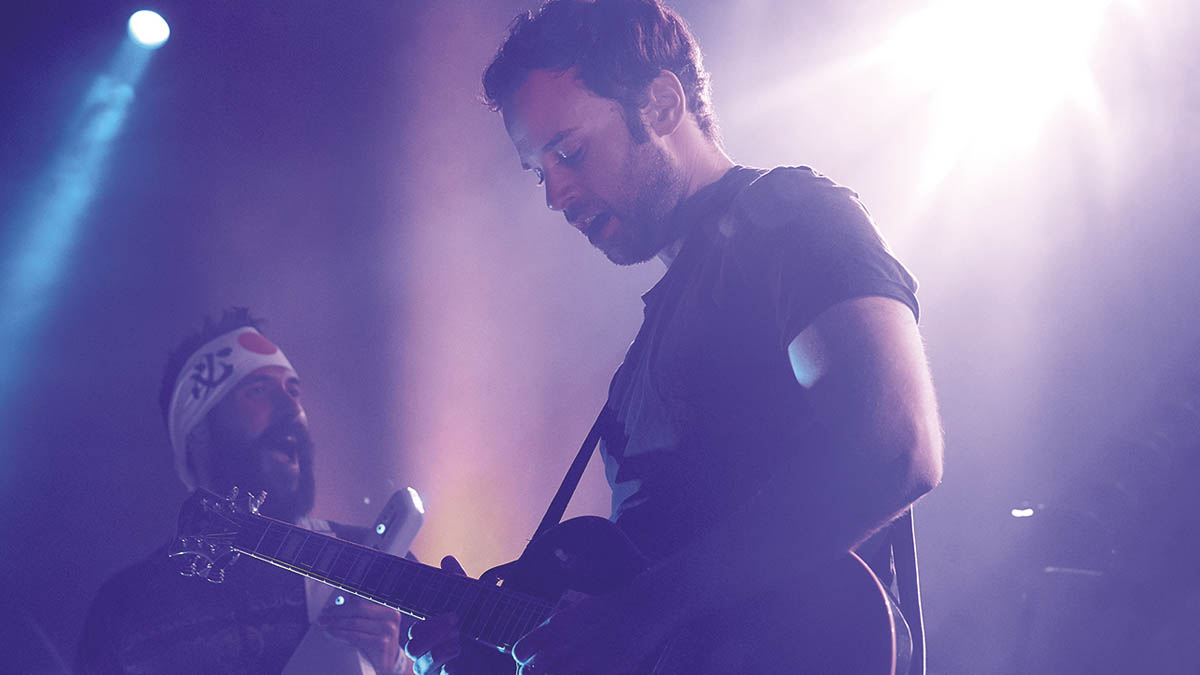
For those of us unfamiliar with scoring, can you walk us through your process?
BIRENBERG: “The process is pretty similar for each episode. We sit down with the showrunners and have a meeting – it’s called a spotting session – and we’ll watch episodes. We usually work on two at a time, so we watch them together and go through every scene with the editors and say, ‘Should there be music here? What’s the music going to be like?’
“And we just make a list: ‘Okay, here we need some emotional stuff, here we have a big fight sequence, here we’ve got this, here we’ve got that.’ Then Zach and I split off and start sketching things out. We’ll go into our separate studios and start working.
“Once things are listenable and put together we start trading files, trading mixes and piling on ideas. A really good example would be [the composition] Strike First, which plays during a scene in Season 1, Episode 1, where Johnny beats up some kids in a mini-mart parking lot. In a lot of ways that was our thesis statement for the show.”
How did that one come together?
ROBINSON: “In terms of Strike First, which is also the music that plays during the end credits of each episode, we watched this scene of Johnny beating the crap out of these teenagers, and our first thought was, ‘We want the music to feel like the music that Johnny hears in his head while he’s doing that.’
“And in his head, he’s the ultimate badass, right? So Strike First came out as something that we think represents Johnny’s version of kicking ass. But it’s sort of our version, too. We grew up in the ’90s, with influences that range from everything from hair metal to video game music. So there’s that kind of video game, ‘boss battle’ feel to it.”
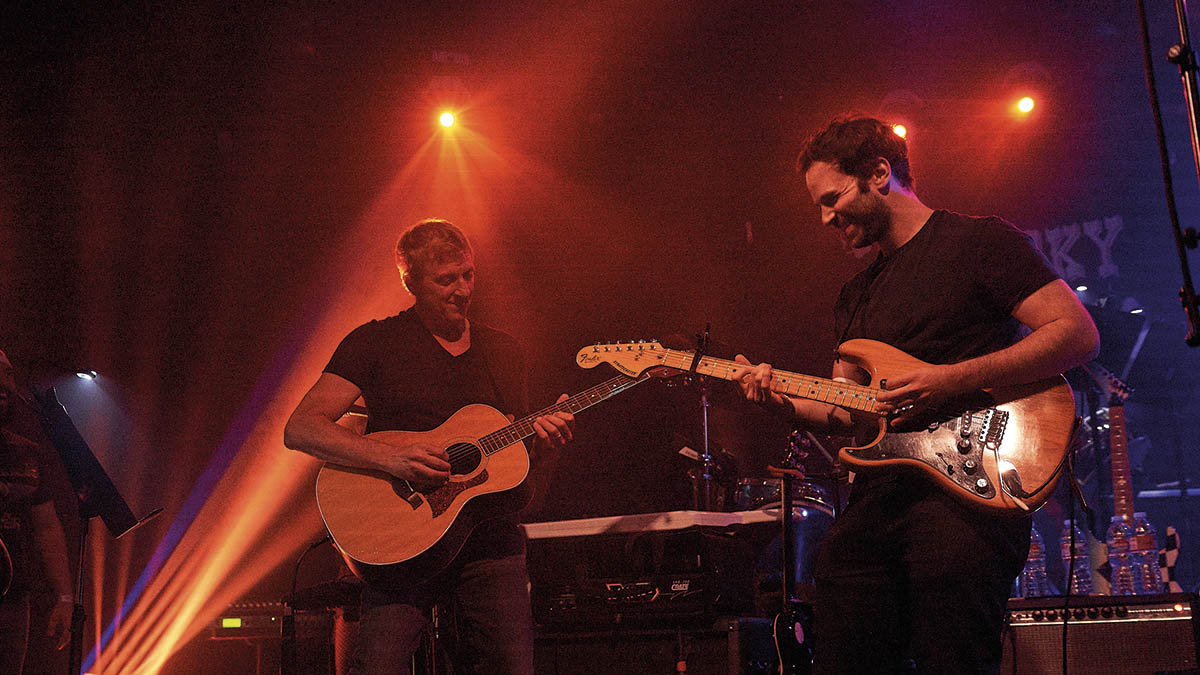
There’s some great guitar on that one.
ROBINSON: “Something that I think we do on our show that I don’t think anyone else does is that we’re pretty unabashed with our guitar usage, and we lean hard into lead guitar in our score. We’re very into shredding and treating the guitar the way Yngwie Malmsteen or Eddie Van Halen would treat a guitar, which is as a virtuosic, symphonic instrument.
“So there’s a lot of moments – in Strike First, or in King Cobra, which ends Season 1, or Miyagi Metal, which ends Season 3 – where we really highlight the guitar. As we’re writing, we make it a point to say, ‘We want to add guitar flourishes here.’ And sometimes we don’t even write the parts.
“We’ll work with amazing guitar players like Andrew Synoweic, a session player in Los Angeles, and Myrone – he calls himself a “soft shredder,” and he’s very video game-influenced – and we’ll say, ‘You’re a master shredder. We want to hit this moment on screen with some type of arpeggio or shred lick,’ or whatever.”
As a fan of the show and also of ’80s rock, I’d imagine that scoring for the Johnny Lawrence character has to be incredibly fun.
BIRENBERG: “It is. And in a lot of ways Johnny is the heart of the show. Or at least the show in Season 1. So originally it was really Johnny’s lens that was our main lens. Which is why we call Strike First kind of our thesis statement: ‘This is the sound, guys.’ That was the first thing we unlocked.
“Then we had to figure out the whole palette: you have the badass rock stuff, the spiritual Miyagi stuff, the more electro-influenced sounds… And then we also went back to the music in the original movies and sort of re-consumed that. We asked, ‘What is it that makes this tick?’ And one thing we noticed is that the music that made the biggest impression on audiences in the original movie wasn’t the score. It was all the songs that were in there, like You’re the Best…"
We basically wanted our score to absorb that song functionality in a lot of ways, and play with the type of energy that those needle drops play with in the movie
Leo Birenberg
Bananarama’s Cruel Summer...
BIRENBERG: “Right. Young Hearts... So we basically wanted our score to absorb that song functionality in a lot of ways, and play with the type of energy that those needle drops play with in the movie. That’s kind of how we came up with our sound and the approach to mixing the genres in scoring.”
The music is not merely a throwback to the ’80s and the original Karate Kid. You also bring in a lot of modern sounds, in particular when you’re scoring for the teenagers, who obviously don’t sit around all day listening to Ratt and Poison. I’m thinking in particular about the score to the big brawl at the high school during the final episode of Season Two.
ROBINSON: “Hallway Hellscape [the piece of music that soundtracks the high-school brawl] was just a really fun one because we got to go all out – it almost feels like a fight in The Matrix or something. But in general when it comes to the kids, one of the ideas we had from the start was that the music they were hearing was going to be kind of influenced by their sensei.
“So for instance, the score for Miguel, during the cafeteria fight in the first season, it’s what he hears when he gets the Johnny Lawrence filter put on him. How does his own personality blend with, like, Ratt, and all this other music that Johnny is exposing him to? That actually became more complicated to do as the show went on because the kids were switching dojos all the time. By the end of Season 2, it’s like, who the fuck are you rooting for on this show? [Laughs]
I love David Lee Roth, too. But I listen to the Hagar stuff and I’m like, ‘This is good music!’
Zach Robinson
“But what we ended up with for the kids is this kind of middle ground where we took the synth-pop ’80s elements from the original Karate Kid soundtrack and mixed them with Johnny’s hair metal and a few other things. And you wind up with a modern EDM-inspired metal hybrid piece of music, which doesn’t feel that far from stuff that you’d hear nowadays from artists like Carpenter Brut or Perturbator.”
All right, now for the important stuff: clearly, Johnny Lawrence is a big fan of Ratt, Zebra and Twisted Sister. What are Leo and Zach’s favorite ’80s hard rock and metal bands?
BIRENBERG: [Laughs] “I love Bon Jovi. I listened to so much Bon Jovi in high school. I don’t even know how I got into it, but it was a major part of my high school life.”
ROBINSON: “I would have to say Iron Maiden, because it got me into guitar. So there’s always a soft spot for that. And then Van Halen – I love ’80s Van Halen. Especially late-’80s Van Halen.”
You’re a Van Hagar man.
ROBINSON: “I mean, I love David Lee Roth, too. But I listen to the Hagar stuff and I’m like, ‘This is good music!’”
How did each of you get into the composing and scoring world? Was that your initial goal, or did you start out wanting to be performers?
I was scoring plays in my high school, and at the same time my band was playing the Roxy and the Whisky and the Troubadour
Zach Robinson
BIRENBERG: “I think I had that performing dream for a bit. And then sometime late in high school I just realized that what made me tick was less about me being the person performing and more about me bossing everybody around and telling them what to play. [Laughs] But like I said earlier, I played saxophone, and my high school had a big jazz program. That was what first led me to look at scores.
“Then later on I went to NYU [New York University], which also has a great film program. My freshman year roommate was a film major, and I just started writing music for his stuff. That was kind of this perfect creative meld for me. And that’s how I ended up on this path.”
ROBINSON: “I started out playing guitar, and that just leads to you being in bands. But I was also interested in film music, and I never thought that being a performer and being a composer were mutually exclusive. So I was scoring plays in my high school, and at the same time my band was playing the Roxy and the Whisky and the Troubadour.
“Having those kinds of parallel lines was really formative for me. So I would say to anyone reading this who really sees themselves as a performer, don’t limit yourself to just that. If you feel like there’s something else kind of calling you, you should explore it.”
A few years back you did actually bring your music to the stage, with a concert at the Whisky a Go Go called Enter the Dojo: The Music of Cobra Kai Live. What was it like to play this music for an audience?
BIRENBERG: “Putting together the concert version of this show was such a creative revelation. We did the concert at the Whisky, which is the ultimate Sunset Strip joint, and then we went and played again at a music and film festival in Spain. We had so much fun taking all the music from the show and expanding it into concert-appropriate pieces. We didn’t want to just go up onstage and do a 90-second track and then another 90-second track. We wanted it to be a freakin’ rock concert!”
You even got Billy Zabka up there.
ROBINSON: “We didn’t even know he played! But yeah, he came up onstage and played his own theme [Ace Degenerate]. Which, by the way, he was only supposed to play rhythm guitar.
“He came to one rehearsal and that was all he did. But then during the show, and you can see it in the YouTube video, my face lights up because he starts playing the melody with me. He had practiced it the night before and surprised us. It was really special. I hope he can do it again with us.”
BIRENBERG: “That’s one thing that’s really cool about this show – it’s a really close-knit group of people, from the cast and creators to the writers, editors and composers. And I think it comes from a place that, I don’t know, Cobra Kai is a bit like the little engine that could.
“It started out as just a YouTube show, and then it became the biggest thing ever on YouTube. It was this giant fish in a small pond. Now it’s on Netflix, and it’s like a giant fish in the ocean, eating everything. [Laughs] It’s an incredible thing to be a part of.”
Rich is the co-author of the best-selling Nöthin' But a Good Time: The Uncensored History of the '80s Hard Rock Explosion. He is also a recording and performing musician, and a former editor of Guitar World magazine and executive editor of Guitar Aficionado magazine. He has authored several additional books, among them Kurt Cobain: Montage of Heck, the companion to the documentary of the same name.










